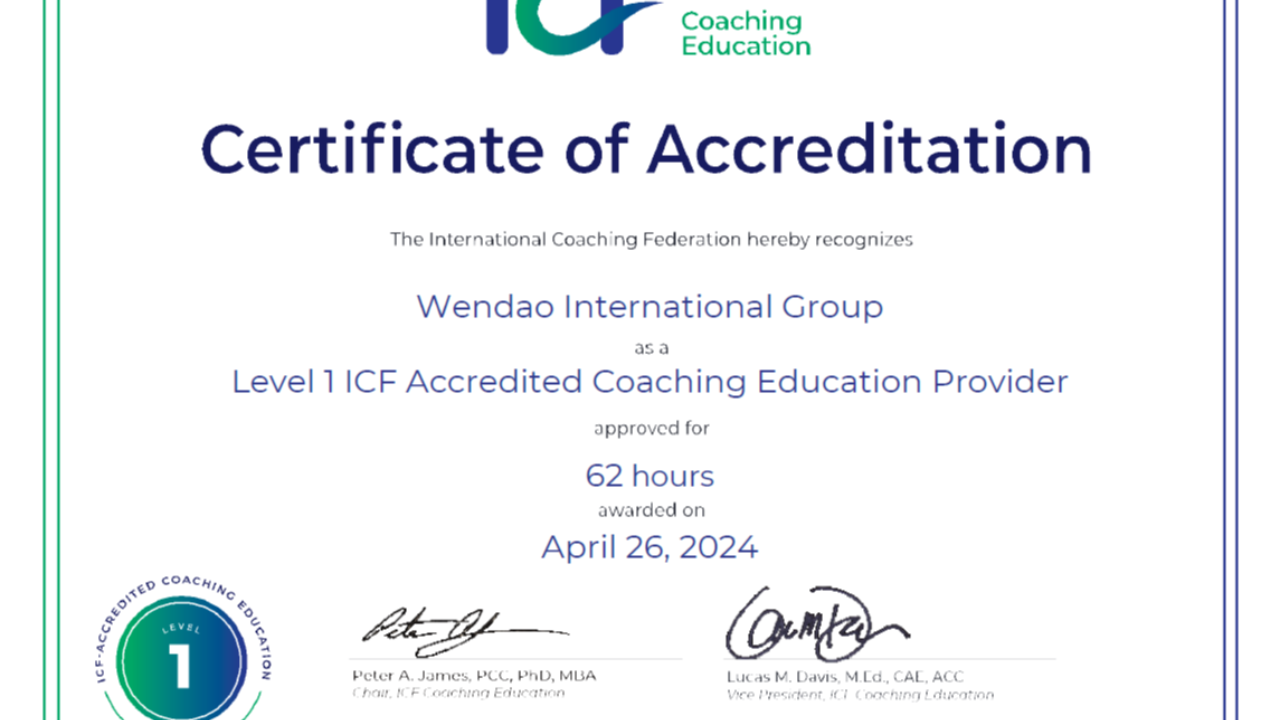
What is an ICF Certified Coach?
Apr 21, 2025In today’s world, more individuals are discovering opportunities for both personal and professional growth, and coaching is often the key to achieving these goals. Among the various coaching certifications available, ICF (International Coach Federation) certification stands out as one of the most respected and recognized in the industry. This article explores what it means to be an ICF Certified Coach, why this certification is important for both coaches and clients, and its impact on professional coaching.
Understanding the International Coach Federation (ICF)
The International Coach Federation (ICF) is the largest global organization dedicated to promoting professional coaching. Established in 1995, ICF sets guidelines and standards for coaches, providing a code of ethics and best practices to ensure ethical and professional coaching. The ICF also accredits coaching programs, ensuring that coaches are trained according to high standards. Membership with ICF indicates that a coach adheres to their ethical guidelines and professional standards, gaining trust within the coaching community.
Key Components of ICF Certification
- ICF Coaching Certification Levels
The ICF offers several levels of certification based on the coach’s experience and competence:
- ICF Certified Personal Coach:This is the entry-level certification for new coaches entering the industry.
- ICF Associate Certified Coach (ACC):Coaches at this level have gained the essential competencies required to implement client-centric coaching strategies effectively.
- ICF Professional Certified Coach (PCC):This is a mid-level certification for experienced coaches who demonstrate a higher level of competence through client results. PCC coaches have proven their ability to support significant client transformations.
- ICF Master Certified Coach (MCC):This is the highest level of ICF certification. It is awarded to coaches with substantial experience and proven results, demonstrating advanced skill and competency in coaching.
- Competency Framework
ICF coaches must master a set of core competencies that define effective coaching:
- Coaching Presence:The ability to establish a genuine, collaborative relationship with the client.
- Communication:Strong listening skills and the ability to guide discussions effectively.
- Trust and Safety:Creating an environment where clients feel comfortable sharing their thoughts and challenges.
- Relationship Skills:Developing a supportive, respectful partnership with clients.
- Coach’s Use of Self:Self-awareness and effective self-regulation during coaching sessions.
- Goal Setting and Action Planning:Helping clients set clear goals and create actionable plans to achieve them.
- Solution-Oriented Approach:Empowering clients to find solutions within themselves, fostering long-term growth.
- Networking:Building and maintaining professional relationships to support ongoing learning and development.
The Path to ICF Certification
Achieving ICF certification involves education, training, and practical coaching experience. Here’s a breakdown of the process:
- Education and Training
Candidates must complete a coach training program accredited by ICF. These programs cover core coaching skills, ethical practices, and the ICF Core Competencies. Training is available in both classroom and online formats to suit different learning styles.
- Coaching Experience
To qualify for ACC certification, coaches must complete at least 100 hours of coaching with real clients. For PCC certification, this requirement increases to 500 hours of coaching experience. These hours ensure that coaches develop the practical skills necessary to support clients effectively.
- Supervision and Mentorship
Coaches are required to undergo mentorship and supervision during their training. They are assigned a mentor who tracks their progress, provides guidance, and helps build their confidence and self-awareness.
- Assessment and Evaluation
ICF certified coaches must undergo a series of evaluations. This includes submitting recorded coaching sessions, reflective essays, and completing assessments conducted by ICF evaluators to assess their competency in applying ICF’s core competencies.
Advantages of ICF Certification
- Professional Credibility
ICF certification is recognized worldwide as a mark of excellence in coaching. It assures clients, employers, and other coaches that the certified individual has met rigorous educational and ethical standards. This enhances a coach’s reputation and opens up professional opportunities.
- Commitment to Excellence
ICF-certified coaches are committed to continuous improvement. The certification process ensures that coaches stay updated with the latest developments in coaching methodologies, helping them provide the best possible service to their clients.
- Access to a Global Community
Being an ICF member provides coaches with access to resources, networks, and opportunities to connect with other professionals in the coaching field. This community supports ongoing learning and development, helping coaches advance in their careers.
- Client Trust and Safety
ICF-certified coaches follow a strict code of ethics, ensuring that clients can trust them to maintain confidentiality, professionalism, and respect during coaching sessions. This trust fosters a safe and supportive environment for clients to explore and achieve their goals.
- Market Differentiation
In a competitive coaching industry, ICF certification sets coaches apart from others. It demonstrates a high level of proficiency, professionalism, and dedication to ethical coaching practices, making certified coaches more attractive to potential clients.
The Impact on Clients
For clients, working with an ICF-certified coach brings numerous benefits:
- High-Quality Coaching Experience
ICF-certified coaches are skilled in delivering structured, goal-oriented coaching sessions. Clients can expect a coaching experience that is both organized and impactful, designed to help them achieve meaningful results.
- Ethical Assurance
ICF-certified coaches adhere to a code of ethics that ensures professionalism and respect. Clients can be confident that their coach will act in their best interests, providing a secure and supportive environment for personal development.
- Measurable Results
ICF coaches focus on achieving tangible outcomes for their clients. By setting clear goals and creating actionable plans, clients are empowered to achieve measurable success and reach their full potential.
- Empowerment and Self-Discovery
ICF-certified coaches encourage clients to find solutions within themselves, fostering self-reliance and confidence. This approach supports long-term personal growth, enabling clients to develop the skills they need to tackle future challenges independently.
Stay connected with news and updates!
Join our mailing list to receive the latest news and updates from our team.
Don't worry, your information will not be shared.
We hate SPAM. We will never sell your information, for any reason.

